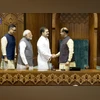By Dan Strumpf and Swati Gupta
For years, Rahul Gandhi and his political allies watched from a lowly perch as Prime Minister Narendra Modi consolidated his power across India.
On Wednesday, Gandhi found himself in a new position: sharing a stage in Parliament with Modi and shaking his hand. It was the result of the once-beleaguered Indian National Congress delivering a stunning setback to Modi’s ruling party, picking up dozens of parliamentary seats during national elections that thrust Gandhi into the spotlight.
“Allow us to represent the voice of the people of India,” Gandhi, 54, said in his first speech as leader of the opposition.
The moment was replete with symbolism. Gandhi’s ascension to a post that’s been vacant for the past decade under Modi’s majority rule officially makes him the prime minister’s chief rival. It also marks a new chapter in his political career and that of the powerful Gandhi dynasty, which ruled India for much of the nation’s recent history but has lately struggled to connect with voters.
The opposition will always defend the Constitution of India. pic.twitter.com/X8c9rIAX8a
— Congress (@INCIndia) June 26, 2024
More From This Section
With the loss of its parliamentary majority, Modi’s Bharatiya Janata Party will now have to work more closely with Gandhi and regional leaders, who promised voters more jobs and welfare for the poor. They’ve vowed more debate over the passing of bills, setting up a more contentious legislature than the rubber-stamp parliament that’s largely been the norm under Modi’s first two terms.
As head of the opposition, Gandhi has sturdier footing to negotiate with Modi. He’ll be afforded powers including the ability to freely meet visiting heads-of-state and help select leaders in key Indian agencies like its election commission and its federal investigative body.
Gandhi’s rise to the leadership post marks a rebirth for his family brand, one of the most formidable in Indian history. Priyanka Gandhi Vadra, Rahul’s sister, is set to run for Parliament for the first time in a separate poll later this year. Three forebears were prime ministers: their father, Rajiv Gandhi; their grandmother, Indira Gandhi; and their great-grandfather, Jawaharlal Nehru, who served as India’s first ruler after the British Raj ended in 1947.
“Rahul Gandhi has great resilience,” said Sugata Srinivasaraju, the author of Strange Burdens, a book about the Congress leader. “He is someone who is not cowed down by the kind of humiliation and the kind of characterisation that he had to go through.”

)